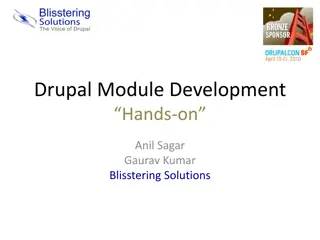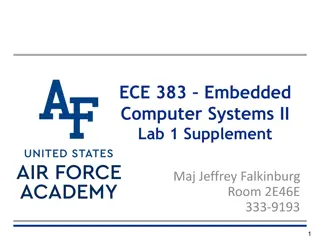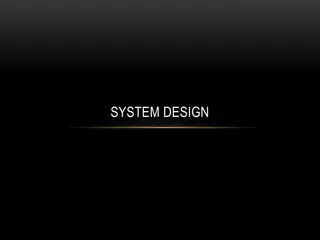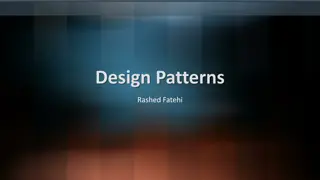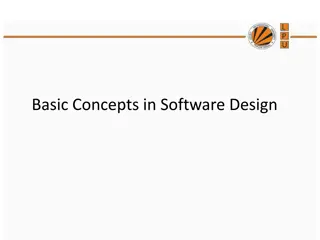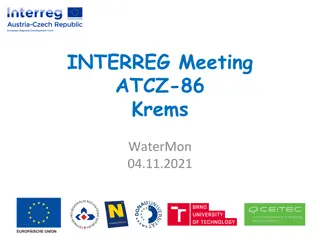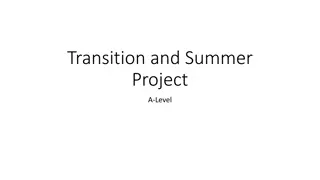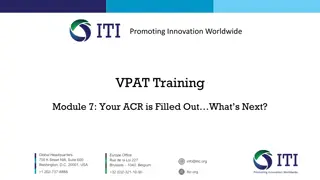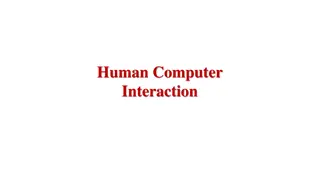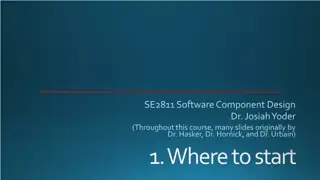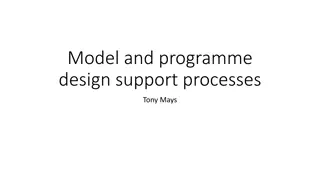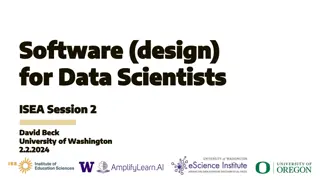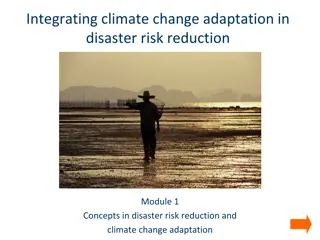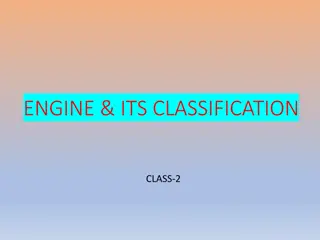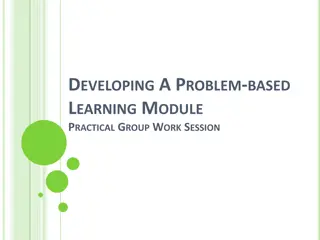Infrastructure Delivery Management System (IDMS) Knowledge Circles Module 6: Portfolio Management
This module delves into the concept of Infrastructure Delivery Management (IDM) within the context of South African organs of state. It outlines the processes and procedures necessary for implementing IDM, focusing on portfolio management as the initial step in a series of four delivery management m
3 views • 36 slides
Early Days in a Care Arrangement Training Module Overview
This training module focuses on the early days in a care arrangement, covering topics such as accepting a care arrangement, building relationships with children, privacy and confidentiality considerations, case planning, promoting a positive self-identity, and advocacy for children and young people.
0 views • 55 slides
Understanding Software Analysis and Design Process
Software analysis and design involve a systematic approach to understanding user requirements, creating logical models, and transitioning to detailed design specifications. Requirements analysis focuses on capturing system requirements, while design translates these requirements into implementation
7 views • 16 slides
Tour Module
Travelopro's Tour module is a one-stop solution for managing a tour business and grow your tour business. Our tour module covers many types of businesses. Our reservation software has made it possible to reserve tours, along with all their criteria, including tickets, hotels, visas, services, and to
4 views • 15 slides
Hotel Module
Discover Travelopro's cutting-edge Hotel Module. Elevate your hospitality experience with our tailored services, designed for hotels of all sizes. The Hotel Module is developed to cater to the needs of the hotel industry. The Hotel Module enables you
2 views • 15 slides
Enhancing Module Design through UDL Principles by Dr. Liam Morris
Dr. Liam Morris, a lecturer at Atlantic Technological University, explores the integration of Universal Design for Learning (UDL) principles into module design and assessment strategies. His focus is on enhancing transparency, ensuring equity, and promoting further improvements in teaching practices
0 views • 7 slides
Teaching Mental Wellbeing in Health Education: Training Module Overview
This training module provides valuable insights into teaching mental wellbeing as part of health education in primary and secondary schools. It covers the new curriculum requirements, examples of good practices, and activities for trainers. Schools are encouraged to adapt the module according to the
3 views • 62 slides
Analysis of Single Component Assessment Exam Feedback for S112 Module
The assessment strategy for the S112 module involves a single exam component alongside several TMAs. Findings show little gaming of the system, with most students submitting assignments. Exam performance correlates with the number of assignments submitted. The outcome of the module seems to be affec
1 views • 27 slides
Scholarly Project Module in MBBS Year 3 Overview
Scholarly Project Module (SPM) in MBBS Year 3 is a pivotal module focusing on developing students into doctors as scholars and scientists. It includes a project-based approach, essential skills development, and assessments like a 3000-word essay. The module runs in the first semester and covers vari
0 views • 11 slides
Guidelines for Design of Cement Concrete Pavement and Interlocking Paver Blocks
This document provides guidelines for designing cement concrete pavements and interlocking paver blocks, covering factors governing design, wheel loads, design period, subgrade characteristics, approximate k values based on CBR values, and the importance of a sub-base below concrete pavements. It em
0 views • 67 slides
Software Engineering Design Principles and Concepts
The chapter discusses the essential principles and concepts in software design, highlighting the four key design models - data design, architectural design, interface design, and component-level design. It emphasizes the importance of traceability to the analysis model, minimizing the gap between so
0 views • 36 slides
Understanding and Applying Behavioural Ethics in Education for Justice (E4J)
This module focuses on debunking common myths about ethical behavior, treating ethics as a design problem, and implementing design-based solutions to encourage ethical behavior. Students will learn to identify ethical risks, turn principles into practice, and design contexts that facilitate ethical
3 views • 10 slides
A Comprehensive Guide to T-TRAK Modular Model Railroad System
Delve into the world of T-TRAK modular model railroads with this detailed guide covering aspects like module construction standards, layout types, benefits, and various construction options. Explore the compact size, collaborative nature, and creative possibilities offered by T-TRAK for enthusiasts.
0 views • 32 slides
Hands-On Drupal Module Development Guide
Unleash your potential with this comprehensive guide on Drupal module development. Explore Drupal architecture, database structures, module types, and hands-on tweet scope. Dive into module architecture, hook implementation, form API, permissions, schema API, and more. Enhance your skills in modifyi
0 views • 86 slides
Grid Pix Field Simulations: Precision Study for Module Design
Aimed at simulating various grid pix designs for a module, focusing on edge effects and E field deformations. The simulations use analytic expressions for E field in rectangular plates, with emphasis on studying the E field design and required mechanical-electrical precision for reducing deformation
0 views • 19 slides
Understanding System on Chip (SoC) Design and Components
Explore the world of System on Chip (SoC) design, components, and working flow. Learn about Intellectual Properties (IP), platform-based design, typical design flows, top-down design approach, and the emerging Electronic System Level (ESL) design flow. Discover the essential components of an SoC, su
0 views • 45 slides
Exploring Design Inspiration and Elements in Costume and Fashion Design
Dive into the world of costume and fashion design through a visual journey of finding design inspiration, understanding the design process, emphasizing originality, and exploring different sources of creativity. Discover how technology, art, food, history, architecture, and nature can spark innovati
0 views • 45 slides
Enhancing Piping Design Efficiency with Spec-Driven Technology
Explore how Spec-Driven Piping technology powered by CADACTIVE offers a standardized approach for piping design in Creo Parametric. This innovative extension streamlines design communication, eliminates errors, and improves design efficiency by utilizing a master catalog, automated checking capabili
0 views • 15 slides
IndustriALL Training on Gender-based Violence and Harassment Modules Overview
IndustriALL provides training on gender-based violence and harassment in the workplace through Modules 1-3. Module 1 covers the introduction to gender-based violence definitions and impacts, aiming to address risk factors, understand definitions, and build union capacity to prevent and address the i
0 views • 71 slides
Material Design: Combining Classic Design Principles with Technological Innovation
Material Design is a design language that combines traditional design principles with the possibilities offered by technology and science. It emphasizes visual language, classic design elements, and innovation to create delightful user experiences. The Material Metaphor, Imagery, Typography, Color,
0 views • 34 slides
Embedded Computer Systems Lab 1: VGA Module Overview
This document provides an overview of Lab 1 for Embedded Computer Systems II, focusing on the VGA module and its functionalities. It includes details about the VGA module entity, its ports, clock signals, trigger voltage and time representation, channel signals, color intensities, row and column val
0 views • 18 slides
Comprehensive Guide to System Design Components and Techniques
System design involves the detailed planning and identification of components in an information system, aiming to provide users with a general understanding of the new system. This process includes techniques like flowcharts, prototyping, and component design, covering aspects such as output design,
0 views • 24 slides
Understanding Design Patterns: A Comprehensive Overview
Exploring the world of design patterns, this content delves into the essence of design patterns, their application in software design to resolve complexity, and the different types of design patterns - creational, structural, and behavioral. It also showcases examples of popular design patterns such
0 views • 22 slides
Understanding Basic Concepts in Software Design
Software design involves transforming customer requirements into a form suitable for implementation, with activities categorized into preliminary and detailed design stages. High-level design focuses on module identification and control relationships, while detailed design entails defining data stru
1 views • 24 slides
Electrochemical Sensing Module Overview and Potentiostat Parameters
In this meeting, the Electrochemical Sensing Module based on the EmStat-pico potentiostat was discussed. The module features precise, low-power control unit Arduino MKR Zero and supports techniques such as voltammetry and EIS. Potentiostat parameters include a full dc-potential range, EIS frequency
0 views • 16 slides
Exploring 3D Design and Critical Analysis in Architecture
Dive into the world of 3D design and critical analysis with a focus on architecture. Discover the stages of design, essential skills for designers, and areas of study in three-dimensional design. Delve into iconic buildings like Frank Lloyd Wright's Falling Water, analyze their key features, and eve
0 views • 9 slides
Understanding Design Patterns in Object-Oriented Design
Design patterns in object-oriented design (OOD) are essential templates that codify best practices for solving common problems. They help streamline development by capturing proven design decisions, promoting code reuse, and enhancing system flexibility and modularity. Learn about the core concepts,
0 views • 20 slides
Understanding the ACR Process for VPAT Training Module 7
In this VPAT training module 7, you will learn what to do once the ACR (Accessibility Conformance Report) is filled out and what steps to take next. This module covers the goals of module 7, upcoming VPAT changes, ACR format delivery options, accessibility testing, publishing the ACR, ensuring an ac
0 views • 11 slides
Understanding Interaction Design in Human-Computer Interaction
Interaction design focuses on creating interactive products that are easy, effective, and enjoyable to use. It aims to reduce negative user experiences while enhancing positive ones. Designing interactive products requires understanding user activities, interfaces, and device arrangements to support
0 views • 11 slides
SE2811 Software Component Design Overview
This course covers software component design, design patterns, object-oriented design, algorithms, and opportunities for reuse in systems design. It emphasizes the importance of domain-level design and provides insights into solving core problems through reusable classes.
0 views • 21 slides
Analysis of Bunch Lengthening in CEPC for Different Design Parameters
This study explores bunch lengthening in the Circular Electron Positron Collider (CEPC) for various design parameters, analyzing a 54 km design scheme, a 61 km design scheme, and a 100 km design scheme. The analysis includes the theoretical framework used, equations for bunch lengthening, and conclu
1 views • 15 slides
Understanding Plain & Reinforced Concrete Structures in Design Engineering
In the design of Plain & Reinforced Concrete structures, various strength design methods such as Ultimate Strength Design (USD) and Allowable Strength Design (ASD) are utilized. These methods involve factors of safety, material strength, load factors, and analysis in the elastic range. Additionally,
0 views • 11 slides
Verilog Adder Examples & Typical IC Design Flow
This comprehensive content delves into Verilog adder examples, typical IC design flow, physical design considerations, and examples of OpenGL ES GPU and ARM hypervisor applications. It covers the fundamentals of digital logic with Verilog design, hardware description language, FPGA prototyping, phys
0 views • 27 slides
Programme Design Support Processes Workshop Series
Explore a series of workshops led by Tony Mays focusing on programme design support processes. From policy frameworks to accreditation applications, decision-makers and designers can enhance their skills through hands-on sessions and homework assignments. The workshops cover various aspects such as
0 views • 7 slides
Impact of Implementing Learning Design Approaches in STEM over 4 Years
Evaluating the impact of implementing learning design approaches in STEM from July 2017 to July 2021, focusing on practices, products, and processes. The study explores the Open University Learning Design Initiative, principles of learning design, and research questions related to the impact on modu
0 views • 16 slides
Understanding the Importance of Software Design for Data Scientists
Today's ISEA Session 2 with David Beck from the University of Washington delves into the critical role of intentional software design for data scientists. The session covers the software design approach, user-centric design stories, use cases, components, testing strategies, and the benefits and dra
0 views • 76 slides
Integrating Climate Change Adaptation in Disaster Risk Reduction Module 1
Welcome to the e-Learning module on integrating climate change adaptation in disaster risk reduction. This module covers concepts in disaster risk reduction and climate change adaptation. It is part of a package that includes five modules focusing on vulnerability, disaster risk reduction, climate c
0 views • 29 slides
Understanding Engine Classification and Design
Engine classification involves categorizing engines based on various factors such as combustion type, number of strokes, cylinder design, and ignition method. Common classifications include external and internal combustion engines, as well as categories based on the design and use of the engine. Add
0 views • 11 slides
Designing a Problem-Based Learning Module for Sustainability Champion Program
Vice-chancellor mandates academic departments to integrate a sustainability-themed module. Your team is tasked with designing a 12-week module focusing on sustainability and transferable skills. Choose a scenario, incorporate technology, develop key skills, plan assessments, and address challenges f
0 views • 6 slides
Comprehensive Overview of Rock Mechanics Module at TISHK International University
This module at TISHK International University delves into the fundamental and advanced concepts of rock mechanics, focusing on design and stabilization of excavations in rock masses. Students gain knowledge on stress, strain, and elasticity relationships in rock masses, enabling them to characterize
0 views • 36 slides













